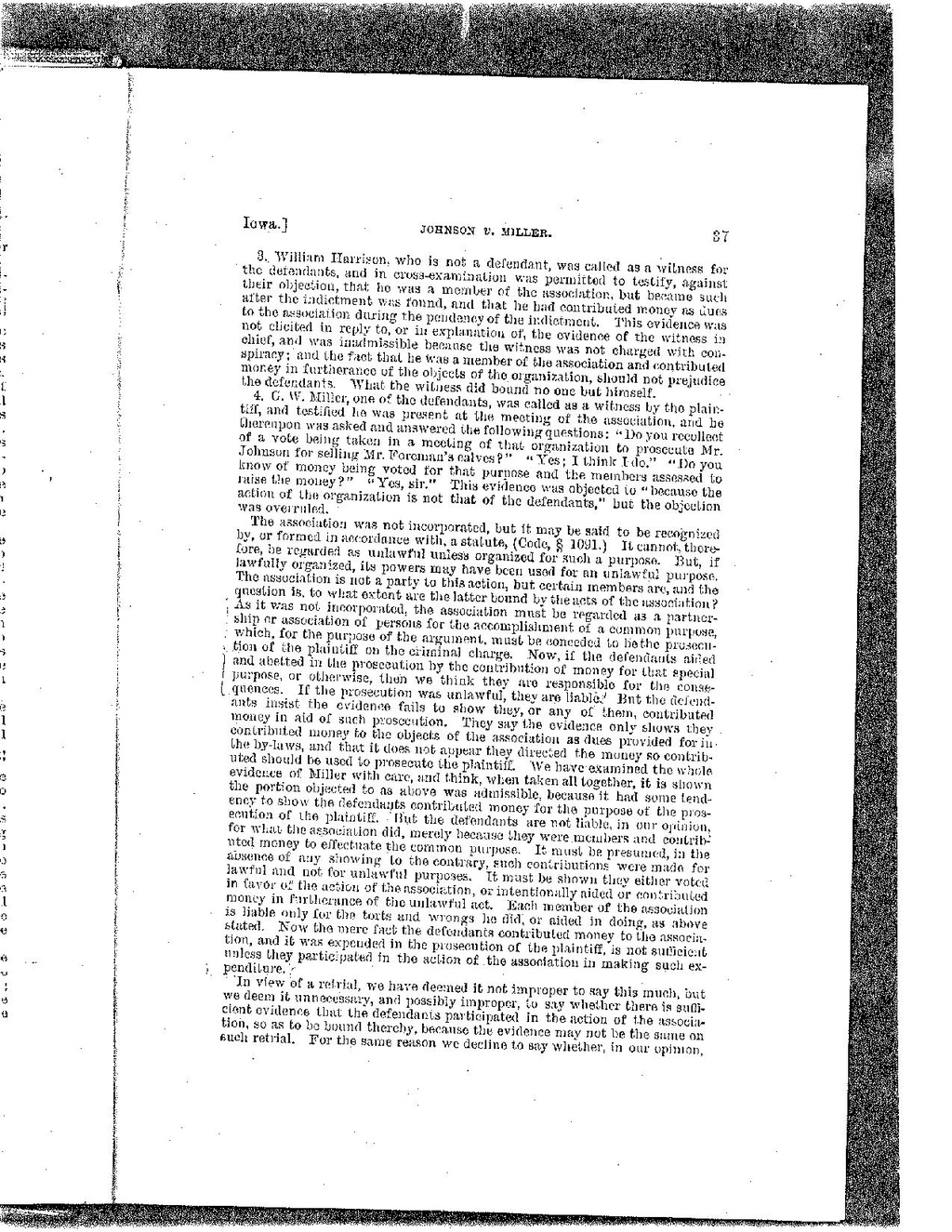William Harrison, who is not a defendant, was called as a witness for the defendants, and in cross-examination was permitted to testify, against their objection, that he was a member of the association. but became such after the indictment was found, and that he had contributed money as dues to the association during the pendency of the indictment. This evidence was not elicited in reply to, or in explanation of, the evidence of the witness in chief, and was inadmissible because the witness was not charged with conspiracy; and the fact that he was a member of the association and contributed money in furtherance of the objects of the organization, should not prejudice the defendants. What the witness did bound no one but himself.
4. G. W. Miller, one of the defendants, was called as a witness by the plaintiff, and testified he was present at the meeting of the association, and he thereupon was asked and answered the following questions: “Do you recollect of a vote being taken in a meeting of that organization to prosecute Mr. Johnson for selling Mr. Foreman's calves?” “Yes; I think I-do.” know of money being voted for that purpose and the members assessed to raise the money?” "Yes, sir.” This evidence was objected to "because the action of the organization is not that of the defendants," but the objection was overruled.
The association was not incorporated, but it may be said to be recognized by, or formed in accordance with, a statute, (Code, § 1091.) It cannot, therefore, be regarded as unlawful unless organized for such a purpose. But, if lawfully organized, its powers may have been used for an unlawful purpose. The association is not a party to this action, but certain members are, and the question is, to what extent are the latter bound by the acts of the association? As it was not incorporated, the association must be regarded as a partnership or association of persons for the accomplishment of a common purpose, which, for the purpose of the argument, must be conceded to be the prosecution of the plantiff on the criminal charge. Now, if the defendants aided and abetted in the prosecution by the contribution of money for that special purpose, or otherwise, then we think they are responsible for the consequences. If the prosecution was unlawful, they are liable. But the defendants insist the evidence fails to show they, or any of them, contributed money in aid of such prosecution. They say the evidence only shows they contributed money to the objects of the association as dues provided for in the by-laws, and that it does not appear they directed the money so contributed should be used to prosecute the plaintiff. We have examined the whole evidence of Miller with care, and think, when taken all together, it is shown the portion objected to as above was admissible, because it had some tendency to show the defendants contributed money for the purpose of the prosecution of the plaintiff. But the defendants are not liable, in our opinion, for what the association did, merely because they were members and contributed money to effectuate the common purpose. It must be presumed, in the absence of any showing to the contrary, such contributions were made for lawful and not for unlawful purposes. It must be shown they either voted in favor of the action of the association, or intentionally aided or contributed money in furtherance of the unlawful act. Each member of the association is liable only for the torts and wrongs he did, or aided in doing, as above stated. Now the mere fact the defendants contributed money to the association, and it was expended in the prosecution of the plaintiff, is not sufficient unless they participated in the action of the association in making such expenditure.
In view of a retrial, we have deemed it not improper to say this much, but we deem it unnecessary, and possibly improper, to say whether there is sufficient evidence that the defendants participated in the action of the association, so as to be bound thereby, because the evidence may not be the same on such retrial. For the same reason we decline to say whether, in our opinion,

